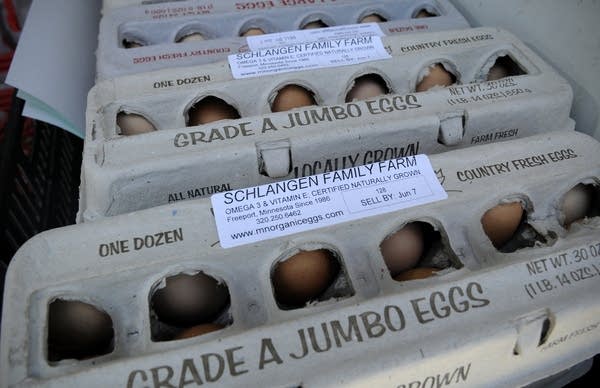Farmer set for trial in Minnesota raw milk case
Go Deeper.
Create an account or log in to save stories.
Like this?
Thanks for liking this story! We have added it to a list of your favorite stories.

A Minnesota farmer who distributes raw milk is due to stand trial next week for food code violations in a case that pits the government's efforts to ensure a safe food supply against consumers' rights to choose what they drink and eat.
Alvin Schlangen, 54, is an organic egg farmer in Freeport, about 75 miles northwest of Minneapolis. He doesn't produce milk himself but operates a private club called Freedom Farms Co-op with roughly 130 members who buy various farm products including raw milk. Schlangen picks up milk products from an Amish farm and delivers them to consumers, mainly in the Twin Cities.
Raw milk is unpasteurized, meaning it hasn't been heat-treated to kill pathogens. Under Minnesota law, it can be sold directly to consumers only on the farm where it's produced. Advocates say it's easier to digest and contains beneficial enzymes that pasteurization destroys. But public health experts say there's little nutritional difference between pasteurized and unpasteurized milk and untreated milk contains harmful bacteria, such as E. coli, salmonella, listeria and campylobacter, that can cause stroke, kidney failure, paralysis or death.
Schlangen, who faces criminal charges in two counties, is set for trial Monday in Hennepin County District Court. His supporters have planned a rally for Monday at the courthouse in Minneapolis.
Turn Up Your Support
MPR News helps you turn down the noise and build shared understanding. Turn up your support for this public resource and keep trusted journalism accessible to all.
"We have a bureaucracy that's intent for whatever reason on making sure people aren't able to get raw milk," Nathan Hansen, Schlangen's attorney, told the St. Cloud Times.
Minnesota Department of Agriculture spokesman Michael Schommer declined to comment on Schlangen's case because it's ongoing. But he said a key element of the department's mission is food safety.
"We cannot arbitrarily choose certain business models or product categories to be exempt from basic food safety and sanitary requirements," Schommer said.

Schlangen is charged in Hennepin County with four misdemeanors, including selling unpasteurized milk products or possessing them for sale. The criminal complaint says inspectors last year searched a Minneapolis warehouse leased by Schlangen, where they found unpasteurized milk and other foods. They also found receipts from sales Schlangen made even though he didn't have a license to sell, handle or store food. Each count carries a maximum penalty of up to 90 days in jail and a $1,000 fine.
Schlangen said he's doing nothing wrong because his members lease the animals that provide the raw milk, so there's no purchase or sale.
He also faces six misdemeanors in Stearns County stemming from a 2010 inspection of his farm, including keeping food products at improper temperatures. Assistant Stearns County Attorney William MacPhail said that case is more about general food safety than raw milk. Schlangen has repeatedly refused to get a food handler's license, MacPhail said.
"The concern here is, whether it's eggs or milk or whatever kind of food, is that Minnesota law requires everybody -- including Alvin -- to properly refrigerate it," MacPhail said.
Schlangen is getting legal help from the Farm-to-Consumer Legal Defense Fund, an advocacy group that has challenged raw milk laws.
Peter Kennedy, president of the fund, said it's not practical for most people, especially Twin Cities residents who live 50 to 100 miles away, to go to a farm to buy raw milk. He said that's why members of Schlangen's club arrange for his deliveries.
"They're happy with what he does for them, and yet the state is trying to get in the way of this private, contractual relationship," Kennedy said.
Schlangen said he won't quit.
"I can't stop doing something that I completely believe in," he said. " ... Unless I'm in jail, I have no reason to stop connecting these families with their food."
___
Information from: St. Cloud Times



